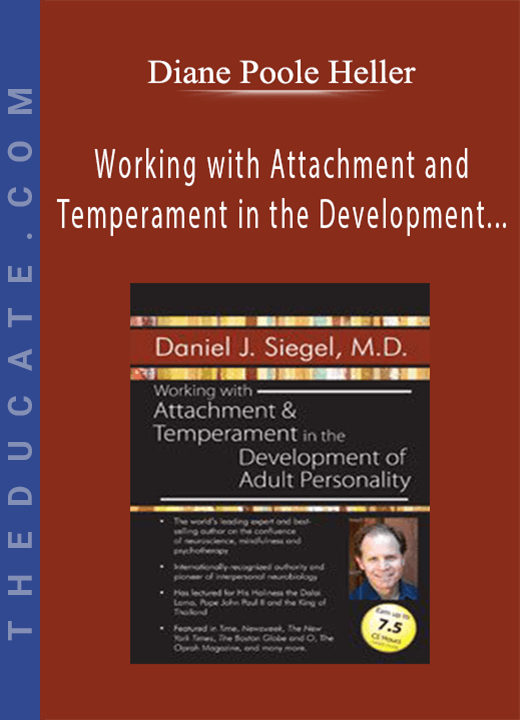Description
Working with Attachment and Temperament in the Development of Adult Personality with Daniel J. Siegel, M.D. – Daniel J. Siegel
Psychotherapy enables individuals to identify patterns of thought, feeling, and behavior that may be restricting them from living a full and rewarding life. Some of these aspects of a person’s presenting profile may be due to experiences from attachment relationships while others may be a function of inborn neural propensities called temperament.
Join Daniel J. Siegel M.D., UCLA brain scientist, psychotherapist, world renowned expert and best-selling author, as he dives deeply into the study of how experiences interact with temperament in the unfolding human personality throughout the lifespan. You will focus on how to disentangle these important but distinct aspects of human development to optimize therapeutic outcome.
- Outline ways in which childhood temperament may persist as adult personality.
- Identify the ways in which attachment influences the development of emotion regulation and the capacity for intimacy in adulthood.
- Discuss how psychotherapy can loosen the grip of temperament and heal the lingering impact of traumatic experiences.
- Identify the spectrum of personality traits and how these fit into the notion of “categories” of attachment.
- Explain the ways in which inborn neural propensities interact with experience to shape personality.
- Recognize the importance of genetics and temperament in human development.
GET WORKING WITH ATTACHMENT AND TEMPERAMENT IN THE DEVELOPMENT OF ADULT PERSONALITY WITH DANIEL J. SIEGEL, M.D. OF AUTHOR DANIEL J. SIEGEL
Serenity, Courage and Wisdom in the Psychotherapeutic Process
- Seeing the range of traits of an individual
- Discerning what is experientially formed adaptations and inborn neural propensities
- Dancing with complexity
The Importance of Genetics and Temperament in Human Development
- Schools of thought regarding temperament
- What does temperament have to do with personality?
- Where do childhood temperament variables go?
How Attachment Experiences Shape Development
- The science of attachment
- Patterns of adaptation
- Longitudinal findings
Neural Development, Relationship Patterns, and the Unfolding of Pathways of Mental Life
- One possible view of fitting temperament with attachment
- The PDP model: Patterns of Developmental Pathways of personality
- Clinical implications of the PDP model
Clinical Assessment of Adult Personality
- Applying the PDP view in day-to-day clinical practice—assessment
- The range of PDP distributions and its relationship to clinical treatment planning
- Learning to be at ease with PDP proclivities
The Chaos and Rigidity of Impaired Integration
- How attachment insecurity increases neural proclivities
- The propensity toward rigidity and chaos
- Planning a therapeutic strategy with PDP in mind
Moving Toward Change: Integration and Coming to Feel at Home in One’s Own Skin
- Enjoying PDP proclivities rather than being imprisoned by them
- Relationships and PDP variables
- Weaving the power of temperament frameworks with the adaptation of attachment within psychotherapy
Healing and Acceptance in Adult Personality
- The Plane of Possibility and the Wheel of Awareness
- Moving toward health in the face of restricted adaptations
- Pleasure in personality and the emergence of acceptance and harmony







8 reviews for Working with Attachment and Temperament in the Development of Adult Personality with Daniel J. Siegel, M.D. – Daniel J. Siegel
There are no reviews yet.